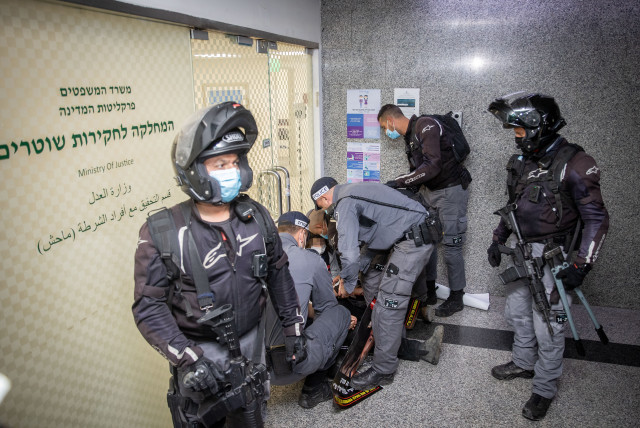Justice reform? Police and prosecutors need to regain public trust - analysis

There are many fine police officers serving the Israeli public, but as some are disenchanted with the judiciary, the many scandals of the police may lead to a reform of law enforcement.
While the judicial reform debate of recent months saw increased scrutiny of the judiciary, recent days showed the failings of law enforcement on multiple fronts.
The largest scandal for the police of late has been the NSO spying saga. A report presented to the Knesset Constitution, Law and Justice Committee on Monday showed how for six years over a thousand Israeli citizens had been spied on with malware.
Police spyware used a program not likely permitted under existing law not only to listen to phone calls, but to access a variety of smartphone applications and correspondence histories. This was done sometimes past warrant expiry dates.
The State Attorney's Office has investigated the matter, but as some politicians noted, this is self-investigation, as government legal advisors and prosecutors approved of the program's use.
Trust at a low-point
Trust in the ability for law enforcement to self-regulate is at a low ebb. Likud MK Moshe Saada has warned about inherent conflicts of interest created by having the Police Internal Investigations Unit (Machash) attached to the State Attorney's Office. His argument is that the police and prosecutors are colleagues, working on the same cases, and have a vested interest in helping one another. Saada, himself a former deputy Machash commander, proposed a bill to separate the unit from the State Attorney.
While the bill is still in committee, on Tuesday the State Comptroller issued a report suggesting the idea's examination. The report was extremely critical of Machash, saying that few indictments were filed and most cases ended in non-criminal punishment. Granted, this could be a legitimate outcome of the facts of the case, but the Comptroller report indicated that there were professional failings in the organization that required at least reviewing the possibility of a complete restructuring of Israeli police internal affairs.
Machash's professional failings were on display on Tuesday in the Jerusalem Magistrate Court ruling on a border policewoman's assault trial. In addition to an assault charge for unneeded physical force against a civilian, the officer had been accused by the prosecution of obstruction of justice for neglecting to mention her use of force in her report - but was acquitted. The court said that the acquittal came about because Machash had failed to properly investigate and conduct interviews on the matter.
The conduct of the policewoman, allegedly using excessive force is something that has become all too common. On Monday an officer was indicted in a Rishon Lezion court for threatening to shoot a group of teenagers. In March, during the judicial reform protests, stun grenades were improperly used against demonstrators.
In the same way, some critics argue that the judicial reforms have distracted from urgent economic and security issues, Policing has become a subject of politicization.
Who controls the police has been brought into question with National Security Minister Itamar Ben-Gvir's Police Law, which subjugates the police to the government and his office. A legal battle is expected over a recent batch of police appointments after Tel Aviv police commander Ami Eshed was moved to a lower position, allegedly a move by Ben-Gvir over the officer's lenient response to protests. Eshed has accused Israel Police chief Kobi Shabtai of "ruining the police," due to his involvement in the allegedly political decision.
While the police are embroiled in political issues and internal scandals, horrible murders continue unabated despite new powers afforded to them to allow them to crack down on gun crime in the Arab sector. On Sunday, a woman and her two infant sons were murdered in Taiba.
There are many fine police officers serving the Israeli public, but as some are disenchanted with the judiciary, the many scandals of the police may lead to a reform of law enforcement.
"Who watches the watchmen?" is a question often asked about authorities, but there is no dire need for watching them in a society in which police have proven themselves trustworthy. They have done the opposite, and need to work to restore that trust.
Jerusalem Post Store
`; document.getElementById("linkPremium").innerHTML = cont; var divWithLink = document.getElementById("premium-link"); if (divWithLink !== null && divWithLink !== 'undefined') { divWithLink.style.border = "solid 1px #cb0f3e"; divWithLink.style.textAlign = "center"; divWithLink.style.marginBottom = "15px"; divWithLink.style.marginTop = "15px"; divWithLink.style.width = "100%"; divWithLink.style.backgroundColor = "#122952"; divWithLink.style.color = "#ffffff"; divWithLink.style.lineHeight = "1.5"; } } (function (v, i) { });

